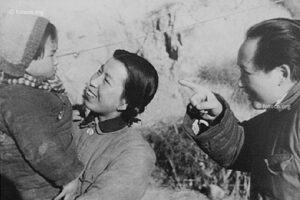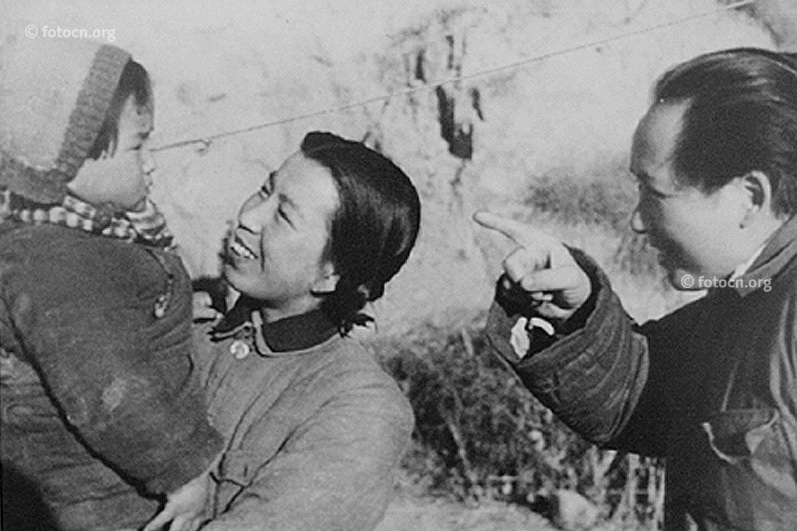Much of Chinese politics is opaque, even for the experts, but certain moments have entered the public consciousness in the West. One of these was the infamous Gang of Four, whose most famous member was Jiang Qing, the last wife of Mao Zedong who ruled China for decades. For those who might not remember, he was the greatest mass murderer in history, even surpassing the number of deaths caused by Hitler. Estimates range as high as 100 million people. Jiang and Mao are shown in the photo with their daughter, who is now 82.
The Gang of Four arose in the 1960s but it was their spectacular downfall in 1976 that made headlines in western countries. None were executed but all received long prison sentences; Jiang made headlines again in 1991 with her suicide.
In his book on elite power struggles in China and the Soviet Union, Dr. Joseph Torigian (assistant professor at American University in Wash DC) devotes and entire chapter to the Gang. He bases it on “newly available memoirs and original documents” that allows, for the first time, “a socio-economic interpretation of this event that links historical evidence with theory.” He notes that Jiang suffered from sexist attacks, and was mocked by one of the trial investigators by asking why she did not have any friends. She did not name any, “arguing that giving their names would lead to their arrest.” She ordered “archived material about her history to be destroyed to eliminate a full investigation of her past.” As for the Gang itself, “the top military hierarchy had no respect for four individuals who had contributed little to the victory in 1949,” referring to the victory of Mao that gave China the cancer of Communism. Ultimately, it was Hua Guofeng, the man took over the Chinese leadership after Mao’s death, who moved against the Gang. “Hua repeatedly complained to his biographer about Jiang’s political style that caused Hua to take an extreme step.” He accused her of throwing temper tantrums at Politburo meetings. But Torigian has found that Jiang “who is often a caricature or joke for people who study Chinese politics, is a much more complicated individual. Primary sources suggest a very different Jiang than commonly thought about.”
Torigian discussed several aspects of his book at the LBJ School of Public Affairs in Austin recently. On the Four, he stated “the Gang combined aggressive tactics with a desire to co-exist with other members of the leadership. Despite some policy inclinations being different from other leaders, those differences were not fundamental, and the Gang did not have their own coherent policy platform. Ultimately, the Gang’s most serious problems were personal, especially with regards to historical problems such as the 1949 victory.”
His book covers the Soviet Union from 1953-57 and China from 1975-81. “The conventional view,” he said in Austin, “is that these transitions, after the deaths of Stalin and Mao, is that they had a lot in common: that there was a confrontation over economics and politics and then there was a triumph of reformers over conservatives or radicals. And that the victories of Khrushchev and Deng [the successors of Stalin and Mao] were essentially all about inter-party democracy and collective leadership.” [Deng was the leader of China from 1978-89; Hua was the designated successor of Mao, and served as leader from 1976-81, when he too was forced out]
The author drew a parallel with this line of thought in the political science (PS) literature, “on how Leninist regimes work. The reason for that is a lot of the PS literature that has thought about authoritarian regimes drew precisely upon these two cases to theorise.” In his study, Torigian exposes the fallacy of this approach to understanding what really transpired during the transitions, whose outcomes had ramifications for the entire world. The model used for those studying Leninist government transtions, which he terms the economic model, is based on three shaky assumptions (1) The leader who provides the best patronage model of popular policy platform wins the power struggle (2) A defined group is enfranchised to choose their leader, and a ‘median voter’ makes the final decision, and (3) The power ministries do not play an independent or unique role.
On the topic of power ministries, Torigian stated they are not an independent force but are invited in. “In that sense the military is a little bit like a vampire, by which I mean that you need to get invited into the house, but once in there you can do a lot of damage. So it’s not the military vs the political leadership, it’s different political leaders using elements within the military to put pressure on other competitors.” This played out, as he explained, in the demise of the Gang of Four. “The palace guards played a decisive role in the arrest of the Gang, with the military playing a crucial backup force.”
This is a very different story to how we have understood China. On the question of evidence to support his research findings, Torigian told the audience that China’s current leader, Xi (who is currently busy stamping out protests across China because of his dictatorial rule), “has explicitly stated that different versions of Chinese history are a threat to the regime. He is someone who thinks that ideals and motivation and conviction in the Party’s cause is absolutely vital to its survival, and as soon as you start telling a different story that makes the Party look not as great.” [I expect that when Xi rewrites the history of 2022, no mention will be made of the protests he is now brutally repressing that put the Party in a bad light.]
“Interestingly,” continued Torigian, “when he talks about this, he often refers to the Soviet Union, saying one of the reasons the Soviet Union failed is that they stopped believing in their own ideology and that this was related to their debunking of their own history.” The parallel with the United States, which was the elephant in the room not mentioned by Torigian, is obvious when one considers the current ruckus over the Confederate legacy and how it is taught in schools or displayed in public monuments. In the Chinese case, scholars in the United States actually have access to primary sources (things intended only for internal circulation) because so many documents are available in American libraries; the UT library in Austin has a big chunk of it.
Revisionist history is always fascinating, and in this case we have the dual revisionism of Xi pretending the past did not exist, and the revisionism of Torigian, which shows us the past as it really happened. A most valuable book for any study of China.
Prestige, Manipulation, and Coercion: Elite Power Struggles in the Soviet Union and China after Stalin and Mao. It is by Yale University Press and lists for $65.
Photo source: http://www.fotocn.org/yinxianwu/2900

